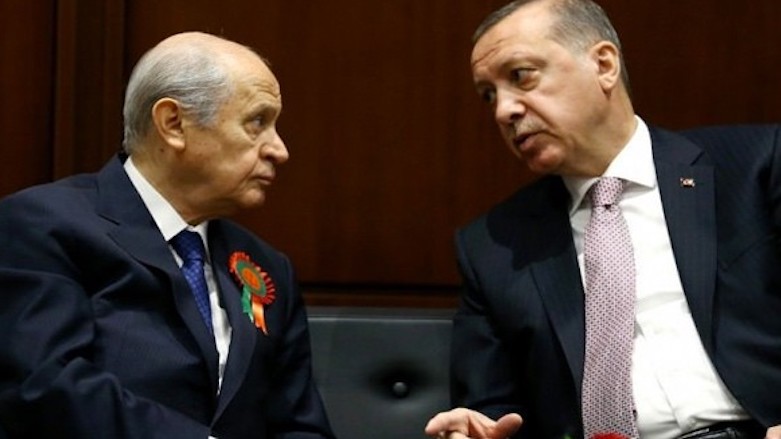Erdogan's AKP negotiates alliance for 2019 elections with far-right MHP

ERBIL, Kurdistan Region (Kurdistan 24) – Turkish President Recep Tayyip Erdogan’s ruling Justice and Development Party (AKP) this week continued a series of talks with the far-right Nationalist Movement Party (MHP) to form a joint bloc for the country’s parliamentary, local, and presidential elections set for 2019.
On Wednesday, delegations from both parties dubbed as “the Commission of National Consensus” sat down for the fourth time in the last two weeks in Ankara, discussing details such as the name of the bipartisan alliance, candidate lawmakers’ lists, the election threshold, and vote sharing.
The choice of the name was in line with the rhetoric of Erdogan who often praises his administration as the “local and national one” in a bid to label the secular opposition blocs, the Republican People’s Party (CHP) and the pro-Kurdish Peoples’ Democratic Party (HDP), as foreign lackeys.
MHP, an ultranationalist anti-Western opposition bloc, and the Islamist-rooted AKP developed a deepening partnership in the aftermath of the 2015 collapse of peace talks with the Kurdistan Workers’ Party (PKK), and the following year’s failed military coup to overthrow Erdogan.
State TV TRT reported that the two parties intended to keep the country’s 10 percent parliamentary election threshold, already the highest among world democracies, in place.
Erdogan has defended the threshold, arguing it was necessary for political stability and prevention of coalition governments which he said were not working.
There were even proposals to raise it up to 15 percent, a government insider columnist Abdulkadir Selvi of the daily Hurriyet wrote in his Thursday piece.
In local elections, MHP and AKP would support the same candidate in towns and cities where they had a similar amount of support among the voters.
Last month, Devlet Bahceli, MHP’s septuagenarian leader, already announced that his party would support Erdogan in the presidential elections.
.jpg)
The staunchly anti-Kurdish leader, despite a significant intra-party hardline resistance, backed Erdogan’s campaign for a stronger presidency with sweeping powers in an April 2017 referendum.
Erdogan currently enjoys powers to dissolve the parliament, declare a state of emergency, issue decrees as the law, and form a cabinet as well as appoint top judicial, bureaucratic, and military officials without a parliamentary vote of confidence.
While MHP made its stance clear for the three 2019 elections, CHP and HDP are yet to nominate a figure politically influential enough to challenge Erdogan.
HDP’s imprisoned Co-leader Selahattin Demirtas who ran against Erdogan in 2014 elections had earlier ruled out a re-nomination with his party effectively paralyzed by an ongoing government crackdown that has seen, other than him, the jailing of eight lawmakers, 80 mayors, and thousands of members.
Under Demirtas’ leadership, HDP became the first pro-Kurdish party to pass the electoral threshold in 2015 elections, costing the AKP another chance to form a single-party government, until Erdogan called for snap elections several months later.
“Take us to Afrin”
“Let the ballot boxes implode, so they regret what they are,” Erdogan told a Thursday AKP youth convention while saying that over “800 terrorists” were killed in his army’s now fortnight-long offensive against the enclave of Afrin in Syrian Kurdistan.
Medical sources in Afrin put the number of civilians that Turkish attacks have killed at over 60 with a hundred others wounded while the US-backed Kurdish People’s Protection Units (YPG) remained silent over its casualties.
“Reis, take us to Afrin,” his supporters shouted in response, using an unofficial title meaning “chief” that has come to be synonymous with Erdogan in recent years.
“We shall go [there] together, God willing,” he said.

